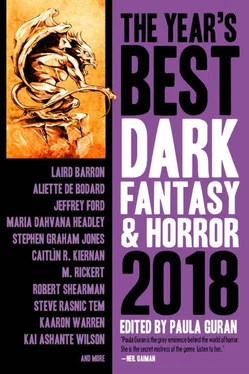He liked the smell, like damp earth everywhere, moist dirt in the air he breathed, like a memory of his future, as if the rain had released something from the dirt of the aging neighborhood. The air grayed around him, fading everything it touched. Or was it his eyes failing? He hadn’t been to an optometrist in years, afraid of what he might be told. Complete failure took a long time to occur, it seemed, but the process was relentless.
The rain was light, so he continued walking for several blocks around the complex. He saw no one, no signs that children had recently played, no signs that any of these houses were occupied at all. There were lights on in a few, but with the lack of residents he guessed they might simply be on for security. And yet he couldn’t believe his cousin had lied to him—what would be the point?
“Hello! I say hello! Is anyone else here?” His voice bounced and echoed against the brick.
As if in reply a distant truck horn sounded like a large animal in distress. Simon was reminded that you couldn’t always trust your senses to tell you the truth. He turned the corner and walked in a different direction, hoping for a new perspective. He peered over fences and gleaned a few new details—mud-encrusted junk, old foundations exposed between patches of unmown grass, an abandoned barbecue lying on its side like a felled animal. But nothing recent, nothing indicating current occupation.
He became gradually aware of the faint stench of invisible smoke, like the memory of an old barbecue, or when his grandmother used to lie about her smoking habit and snuck off behind the house for a drag or two before the cancer eventually took her.
He came to a wide circle in the lane with a bent and dead streetlight poised over it like some kind of giant predatory insect. When he was a boy the neighborhood kids used to gather beneath the streetlights and ride their bikes at night. He stooped down—there were warm cigarette butts beneath the crippled lamp post. He looked around, saw nothing, and the charcoal sky split open from the weight of water, beating him momentarily to the ground.
He looked up, saw the dark twisted shapes lingering nearby like a collection of corroded statues, their rude fingers pointing as they plotted their harassment. All around him the blurred outlines of the houses had added a story or two, with high roofs swaying precariously overhead. Cats encased in their wet and wiry fur took swipes at his face. Simon ran to find shelter, pushing himself against a greasy brick wall. He thought he recognized the house—someone’s aunt had lived there when he was a child. But that was impossible. He looked up to find the window where she used to watch for her husband, and found slanted yellowed eyes staring at him through the rain—he thought maybe some feline’s eyes, or child’s. The pale face that suddenly appeared around the eyes was much like a skinny child’s face, surrounded by a matted cloud of ashen hair. But he was greatly fatigued, and this was the only face he’d seen in a couple of days, and he found it increasingly difficult to see in this dimness. This is what getting old is like , he thought. A long fade into evening .
The rain began to ease and so Simon headed toward home. With each step the force of the rain lessened and the clouds of moisture dissipated, and no house was over a story again, the houses beaten down, until he reached his own house where everything was remarkably dry. Something escaped out of his back yard—a tangle of broken or too-many-segmented legs. A truck was parked out front and two squat men were unloading the bed his cousin promised.
There was a leak in the kitchen faucet, the water oozing like syrup. It had begun raining again, beating against the house like a thousand tiny fists. The house appeared to resent the abuse and issued some grumbling complaints of its own.
At least the bed made Simon feel more civilized. It wasn’t particularly comfortable, though better than a sleeping bag on the floor. But now he could imagine uninvited guests hiding beneath. He wasn’t a child anymore, of course, but he was feeling very little like an adult. He tried to sleep but could hear tiny tappings on the house’s most distant windows, water still dripping from the rain or maybe the trapped beating of moths against the glass. Eventually succumbing, he dreamed of a small riot he’d witnessed as a child—teenagers throwing bricks, someone’s mother screaming, faces washed in blood. The young sometimes simply couldn’t take it anymore and had to strike out because of conditions. But sometimes when you were old you were too wrapped up in your memories to move as fast as you should—you got hurt lying in the way.
The next morning he found long strands of, presumably, animal hair coiled in the corners of the room and lying across his blanket. But he had been cleaning aggressively and couldn’t imagine where these coarse strands had been hiding. As the sun rose the movement of shadow inside the house became unceasing: trees bending outside the windows, the travel of clouds across dark patches of sky, and the nearby houses rising up hazily and swaying in the wind.
He crawled from out of the covers and staggered to the back door in trepidation, but there were no big houses in the back yard today. By the fence a cluster of weeds and something else unrepentantly tangled. He looked for eyes but could find none.
He thought he heard children playing in some remote yard, bossy and excited and dramatic and now and then hurt and crying over nothing and everything. But this might have been a memory. He didn’t bother to look around. He suspected he wouldn’t find anything.
Gazing up at the overhead electrical lines that traveled over the back yard Simon observed their poor state of repair. Tiny bits of black insulation lay scattered like dead bugs all over the grass.
He took another stab that morning at cleaning. It shouldn’t have been necessary, but dust seemed to come out of nowhere to spoil the rooms. The floorboards weren’t tightly fitted—dust from the crawlspace underneath seeped through. Dust also came down from the ceiling, from the flaws at the corners and the holes where plants once hung. It came back as fast as he wiped it away. Dust also issued from the loose-fitting windows and from under the front door. Many of the yards in the development had gone back to bare ground and now the wind was redistributing them.
He stayed away from the windows, not even wanting to look. Sometimes outside there were old house facades that shouldn’t have been there, and slanting shadows from tall houses torn down decades ago. He could see the way the light shifted inside as the outside world impossibly changed—and if he were to look out he’d have to doubt his own sanity.
He still had seen no teenagers, no children of any kind, but he heard their feet scuffling outside, and the ragged sounds of their breath as they ran away. Where were their parents? Where were anyone’s parents? No doubt hiding beneath their beds. At least the cats he’d seen had left him alone.
As if in answer his own bed creaked and something shifted in the light, but Simon refused to turn around. If he just kept his mind on cleaning he would be fine.
Early that afternoon the clouds lifted and light glared across the bedroom ceiling. He witnessed the vague lines in one corner of the heavily textured surface, the slightly depressed outline of a trapdoor into the attic.
It made sense, of course. Each of these houses would have some sort of attic. He could see a fuzz of lines along one side of this small hatch—cobwebs or insect legs or simply an accumulated string of dust hanging down. Perhaps if he removed some of the attic dust he wouldn’t have such a dust problem below. And besides, there might be things put away up there and forgotten, treasures no one remembered.
Читать дальше












